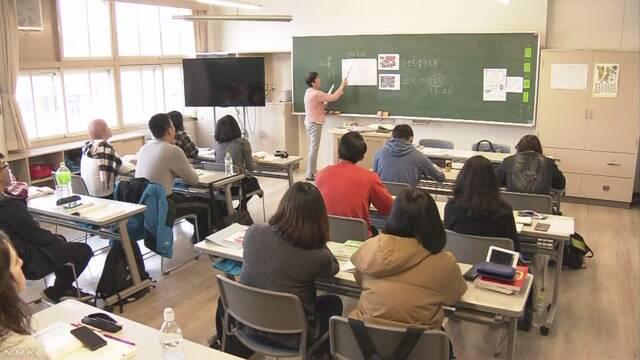While more than 80-percent of Japanese municipalities report their Japanese population is shrinking, some are showing overall growth with the influx of foreign residents.
In some cases, foreign residents are becoming a bulwark against the demise of the town.
Offering Japanese language training
The town of Higashikawa in central Hokkaido set up its own Japanese language school 3 years ago.
The town government is trying to draw students from Thailand, Vietnam and other parts of Asia, and covers half their tuition fees as an incentive. It also subsidizes dormitory fees and offers other kinds of assistance. For example, students receive a voucher to use at the local shopping mall. They can buy up to 8,000 yen, or about 72 dollars' worth of goods per month.
Some of the students say they chose to study in the town because their living expenses are not as high as they would be in Tokyo or Osaka.
Foreign students a budgetary advantage
The town sees a tax advantage in hosting foreign students. Local municipalities receive national tax transfers based on the size of their population. The town of Higashikawa currently hosts 200 foreign students and estimates this will give it an additional 40 million yen, or about 360,000 dollars, in tax transfers. It wants to use these funds to improve welfare services for seniors and families raising children.
The town mayor says it doesn't matter whether residents are Japanese or foreign. He says just having residents period is enough and means a lot.
Officials with Japan's internal affairs ministry say the additional tax transfers are legitimate as long as the foreign students are living in the municipalities. They point out that having more residents adds to local administrative costs.
But keeping the students after graduation remains a challenge. Japan will only grant visas to foreign students who have completed university in their home country, or are entering a university or a vocational school in Japan after graduating from a Japanese language school.
As a result, most foreign students leave after graduation. Only 2 foreign students have settled in Higashikawa. The mayor says he wants more students to stay and play a role in the town's survival.
Managing greater reliance on foreign residents
An official with the Japan Center for International Exchange says local governments are stepping up efforts to encourage foreign students and other non-Japanese residents to stay in Japan.
He says the central government should devise a way to better manage this trend because municipalities can't do it on their own.
Japan's shrinking population remains an urgent challenge. The time has come for a national discussion about the role foreign residents can play in revitalizing local communities.
